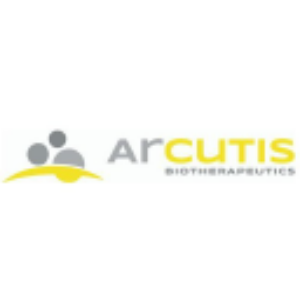Arcutis Presents Late-Breaking Data From INTEGUMENT-PED Phase 3 Trial of Roflumilast Cream 0.05% in Atopic Dermatitis in Children Ages 2 to 5 at the American Academy of Dermatology Annual Meeting
- Investigational roflumilast cream
0.05% met the primary endpoint and all secondary endpoints, showing significant improvement across multiple efficacy endpoints as early as Week 1 39.4% of children treated with roflumilast cream0.05% achieved a75% improvement in Eczema Area and Severity Index (EASI-75), a key secondary endpoint- New data highlight rapid and significant reduction in itch as early as 24 hours following first application of roflumilast cream
0.05% based on daily Worst Itch Numeric Scale (WI-NRS) - New data show
35.4% of children treated with roflumilast cream0.05% achieved a validated Investigator Global Assessment – Atopic Dermatitis (vIGA-AD) score of ‘clear’ or ‘almost clear’ at Week 4, with significant improvements seen as early as Week 1 - Results for roflumilast cream
0.05% , show consistent efficacy and favorable safety and tolerability profile from the INTEGUMENT-1 and INTEGUMENT-2 pivotal trials
SAN DIEGO, March 10, 2024 (GLOBE NEWSWIRE) -- Arcutis Biotherapeutics, Inc. (Nasdaq: ARQT), a commercial-stage biopharmaceutical company focused on developing meaningful innovations in immuno-dermatology, today presented in a late-breaking clinical trial session at the American Academy of Dermatology (AAD) annual meeting (San Diego, CA, March 8 – 12) new data from its INTEGUMENT-PED pivotal Phase 3 study of investigational roflumilast cream
Results showed
“For the pediatric patient population, tradeoffs between efficacy, tolerability, and safety are critical aspects of atopic dermatitis treatment decisions. In addition, tolerability is paramount, and if there are problems with tolerability, there is a hurdle for adherence,” said Lawrence F. Eichenfield, MD, professor of dermatology and pediatrics and vice-chair of the department of dermatology at UC San Diego School of Medicine, and study investigator. “These tradeoffs are further amplified in young children, which is why having a well-designed formulation that doesn’t disrupt the skin barrier benefits the patient and decreases the concerns of caregivers. The results from this study of once-daily application of roflumilast cream
Roflumilast cream is an investigational once-daily, steroid-free topical cream formulated to deliver drug without disrupting the skin barrier. INTEGUMENT-PED enrolled 652 children ages 2 to 5, with a mean Body Surface Area of
New data highlighted in the session included
“We are pleased to present these data from our pivotal Phase 3 INTEGUMENT-PED study of roflumilast cream in children aged 2 through 5, which provide strong support for the safety and efficacy in this young age group and are consistent with the results with roflumilast cream across our atopic dermatitis development program,” said Patrick Burnett, MD, PhD, FAAD, chief medical officer, Arcutis. “Roflumilast cream
Roflumilast cream
About INTEGUMENT-PED
The “INterventional Trial EvaluatinG roflUMilast cream for the treatmENt of aTopic dermatitis in PEDiatric patients” (INTEGUMENT-PED) was a Phase 3, parallel group, double blind, vehicle-controlled trial in which roflumilast cream
About Roflumilast Cream
Roflumilast cream is a next generation topical phosphodiesterase-4 (PDE4) inhibitor. PDE4 – an established target in dermatology – is an intracellular enzyme that increases the production of pro-inflammatory mediators and decreases production of anti-inflammatory mediators. Roflumilast cream
Roflumilast cream is uniquely formulated as a non-greasy emollient cream that absorbs quickly and does not disrupt the skin barrier. In addition, roflumilast cream does not include sensitizing excipients or irritants, such as propylene glycol, polyethylene glycol, isopropyl alcohol, ethanol, or fragrances.
About ZORYVE® Cream
ZORYVE (roflumilast) cream is indicated for topical treatment of plaque psoriasis, including intertriginous areas, in patients 6 years of age and older.
IMPORTANT SAFETY INFORMATION
ZORYVE is contraindicated in patients with moderate to severe liver impairment (Child-Pugh B or C).
The most common adverse reactions (≥
Please see full Prescribing Information.
About Arcutis
Arcutis Biotherapeutics, Inc. (Nasdaq: ARQT) is a commercial-stage medical dermatology company that champions meaningful innovation to address the urgent needs of individuals living with immune-mediated dermatological diseases and conditions. With a commitment to solving the most persistent patient challenges in dermatology, Arcutis has a growing portfolio including two FDA approved products that harness our unique dermatology development platform coupled with our dermatology expertise to build differentiated therapies against biologically validated targets. Arcutis’ dermatology development platform includes a robust pipeline with multiple clinical programs for a range of inflammatory dermatological conditions including scalp and body psoriasis, atopic dermatitis, and alopecia areata. For more information, visit www.arcutis.com or follow Arcutis on LinkedIn, Facebook, and X.
Forward-Looking Statements
Arcutis cautions you that statements contained in this press release regarding matters that are not historical facts are forward-looking statements. These statements are based on the Company’s current beliefs and expectations. Such forward-looking statements include, but are not limited to, statements regarding the potential and timing for roflumilast cream to be approved by the FDA for the treatment of adults and children with atopic dermatitis, the potential of real-world use results of roflumilast cream, and the potential for roflumilast cream to advance the standard of care in atopic dermatitis and other inflammatory dermatological conditions. These statements are subject to substantial known and unknown risks, uncertainties and other factors that may cause our actual results, levels of activity, performance, or achievements to be materially different from the information expressed or implied by these forward-looking statements. Risks and uncertainties that may cause our actual results to differ include risks inherent in our business, reimbursement and access to our products, the impact of competition and other important factors discussed in the "Risk Factors" section of our Form 10-K filed with U.S. Securities and Exchange Commission (SEC) on February 27, 2024, as well as any subsequent filings with the SEC. You should not place undue reliance on any forward-looking statements in this press release. We undertake no obligation to revise or update information herein to reflect events or circumstances in the future, even if new information becomes available. All forward-looking statements are qualified in their entirety by this cautionary statement, which is made under the safe harbor provisions of the Private Securities Litigation Reform Act of 1995.
Contacts:
Media
Amanda Sheldon, Head of Corporate Communications
asheldon@arcutis.com
Investors
Latha Vairavan, Vice President, Finance and Investor Relations
lvairavan@arcutis.com
Derek Cole
Investor Relations Advisory Solutions
derek.cole@iradvisory.com









